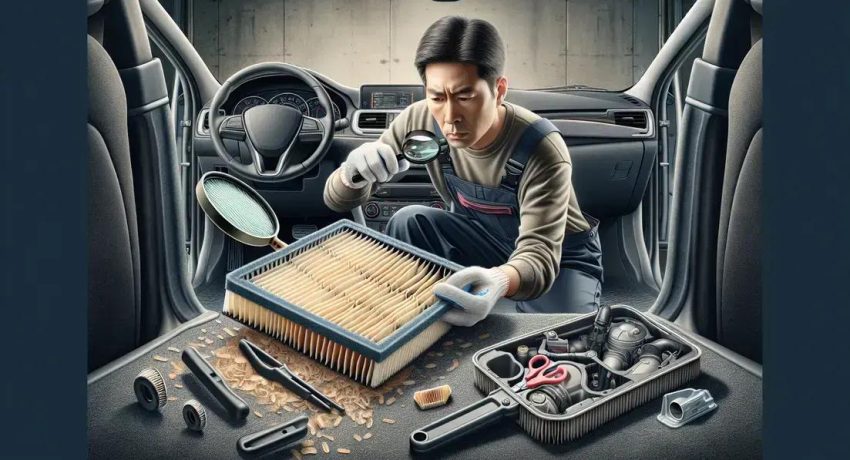Changing your cabin air filter improves air quality by removing dust, pollen, and pollutants, enhancing breathing conditions and reducing odors in your vehicle.
Have you ever wondered when to change cabin air filter for your vehicle? This small component plays a big role in ensuring the air inside your car is clean and fresh. Let’s dive into what affects its lifespan and when to make the switch.
Table of Contents
ToggleSigns your cabin air filter needs changing

Understanding the signs your cabin air filter needs changing can greatly enhance your driving experience. A clean air filter is essential for ensuring that the air inside your vehicle is free from pollutants and allergens.
Unpleasant Odors
If you notice a strange or musty smell inside your car, it may be time to check your cabin air filter. This odor often indicates that the filter is clogged and unable to effectively remove contaminants from the air.
Reduced Airflow
Another sign is a noticeable decrease in airflow from your car’s air conditioning or heating system. If it feels like the air is not circulating as it should, the cabin air filter might be restricting airflow due to dirt and debris buildup.
Allergies and Irritations
If you or your passengers experience increased allergy symptoms while driving, a dirty cabin air filter could be the culprit. A clean filter helps trap pollen and other allergens, providing a more comfortable environment.
Frequent Dust Buildup
Pay attention to how quickly dust accumulates on your dashboard and interior surfaces. If you find yourself cleaning more often, it might indicate that your cabin air filter is failing to filter out pollutants effectively.
Monitoring these signs will help maintain air quality and comfort in your vehicle, making it a more pleasant driving environment.
How changing your cabin air filter improves air quality

Changing your cabin air filter can profoundly impact the air quality in your vehicle. A clean air filter helps to remove dust, pollen, and other pollutants from the air before it enters the cabin.
Improved Breathing Conditions
When you replace a dirty cabin air filter, you enhance the breathing conditions inside the car. Fresh air reduces allergies and respiratory problems for you and your passengers, making every ride more enjoyable.
Reduction of Odors
A new cabin air filter can also eliminate unpleasant smells. Over time, a clogged filter can trap odors, which can lead to a musty or stale environment. By changing the filter, you significantly improve the freshness of the air.
Better Defogging and Airflow
Replacing your air filter can also improve airflow through your heating and cooling system. This means faster defogging of your windows during damp conditions, enhancing visibility and safety when driving.
Energy Efficiency
When your cabin air filter is clean, the HVAC system operates more efficiently. This can contribute to better fuel economy, as the engine doesn’t have to work as hard to maintain the desired cabin temperature.
Regular maintenance, including changing your cabin air filter, is key to ensuring a clean and comfortable environment inside your vehicle.
In summary, keep your cabin air filter fresh
Changing your cabin air filter is an essential step for better air quality in your car. It plays a vital role in reducing allergens, odors, and improving airflow.
Regular maintenance of your cabin air filter not only enhances your driving experience but also promotes a healthier environment for you and your passengers.
Make it a habit to check and replace your cabin air filter as part of your vehicle upkeep. Doing so ensures you can enjoy clean, fresh air every time you hit the road.
FAQ – Frequently Asked Questions about Cabin Air Filters
How often should I change my cabin air filter?
It is generally recommended to change your cabin air filter every 12,000 to 15,000 miles, but check your vehicle’s manual for specific guidelines.
What are the benefits of a clean cabin air filter?
A clean cabin air filter improves air quality, reduces allergens and odors, enhances airflow, and can contribute to better fuel efficiency.
Can I change the cabin air filter myself?
Yes, changing the cabin air filter is often a simple task that you can do yourself. Just consult your vehicle’s manual for instructions.
What signs indicate that my cabin air filter needs to be replaced?
Signs include unpleasant odors, reduced airflow, increased allergy symptoms, and visible dust buildup inside the car.
Does a clogged cabin air filter affect my vehicle’s performance?
Yes, a clogged cabin air filter can reduce airflow in the HVAC system and strain the engine, potentially affecting performance and fuel efficiency.
Where can I find the cabin air filter in my car?
The cabin air filter is typically located behind the glove compartment or under the dashboard. Refer to your vehicle’s manual for the exact location.






